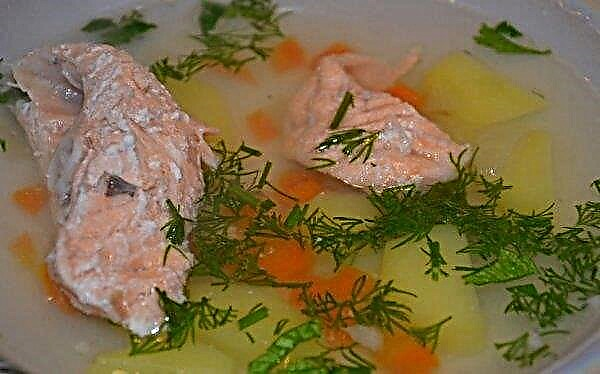Carrots are one of the most useful edible root crops with a rich vitamin and mineral composition. It brings great benefits to the body, especially since it refers to the cultures we are familiar with. However, when breast-feeding a baby, there are peculiarities in eating carrots, which we will familiarize with further.
Did you know? The birthplace of carrots is Afghanistan, where it grew in natural conditions and was a deep purple color. But the Netherlands familiar to us was presented to the world by the Netherlands in a selective way.
Can eat or not
If you briefly answer this question, then - yes, no doubt, carrots can be consumed by a nursing mother. This vegetable nourishes the body with the necessary vitamins and minerals, helps to strengthen health and increase the immunity of both mother and baby.
Useful properties of carrots for mother and her baby
The beneficial effect of this root crop is determined by its rich vitamin and chemical composition, especially the high content of vitamin A - retinol. It is vital for the proper development of the baby and the maintenance of the health of his mother. Retinol is actively involved in the formation of immunity, and hence the body's resistance to viral infections.
Breastfeeding allows you to saturate the baby's body with vitamin A naturally through breast milk. This culture is also part of some cosmetics and masks that improve the condition of the skin, hair and nails of a nursing woman.
- During HB, the product is necessary for the following reasons:
- high calcium content allows you to strengthen the skeletal system of mother and baby;
- beta-carotene has antioxidant properties, removing free radicals and preserving youth in a natural way;
- long-term intake of the product (140-150 g per day) reduces the amount of "bad" cholesterol in the blood by 20%;
- high potassium content helps strengthen the heart and blood vessels;
- the vegetable has a good effect on vision, helping to cope with "night blindness";
- iron protects the body from anemia, increases hemoglobin and is a prevention of childhood rickets;
- vegetable increases the physical tone of the body, replenishes strength, adds energy;
- carrots have a positive effect on the lactation process;
- low calorie root (only 35 kcal per 100 g) allows you to use it without fear of gaining excess weight.

Harm and possible contraindications
No matter how useful the vegetable may be, it should not be included in the diet if individual intolerance to this product was previously observed. With great caution, women with gastric problems, especially peptic ulcer, should also treat it.
In addition, it is believed that red or orange vegetables and fruits in the diet of a mother can cause allergies or digestive disorders in the child. And although not every child has intolerance to fruits of this color, it is better for a nursing mother to gradually start consuming bright vegetables and fruits.
Important! If nausea, severe headache, rash, or discolored skin appear after eating the vegetable, you should immediately seek medical help.
You should also know how allergies can occur in infants. This can be a rash or peeling, diaper rash, upset stools, or frequent spitting up. In this case, carrots should be removed from the diet for several months, after which, after consulting with a pediatrician, try to enter it again.
In addition, it is important to know under what conditions the crop grew, what nitrates and top dressings the site with root crops was processed, so it is better to purchase fruits from a reliable, trusted producer or grow them yourself.
Eating carrots by breastfeeding
The introduction of this root crop into the diet of a nursing woman depends on the age of the baby.
In the first month
At first, the digestive organs of a newborn baby are still immature and are just beginning to adapt to food, so mom should be selective in his diet.The first 2-3 weeks from the birth of the baby, it is better not to eat carrots at all and only then gradually introduce it into the diet.

And you need to start literally in quarters of a small boiled root crop and eat it in the first half of the day, after which carefully monitor the reaction of the baby, tracking possible allergic reactions, behavior changes, skin and stool conditions.
Raw vegetable is not recommended, as it can cause digestive problems in the child. In the absence of a negative reaction in the baby, you can gradually bring the amount of the product to 2 small boiled root crops per day over a week.
In the second month
During this period, in the absence of side effects, a nursing woman can eat boiled or baked carrots in the amount of 100-150 g per day. Raw carrots are still not included in the diet.

In the third month
If the baby is completely healthy, then the mother can gradually return to her usual diet. You should not do this abruptly, it is better to introduce one new product for the child every 2-3 days and observe his reaction. Cooked or baked carrots can be consumed 3-4 times a week, 150 g per day.
You can drink carrot juice well diluted with water (concentration not higher than 50%), while it is better to start with 1-2 sips per day and do not forget to monitor the reaction of the child.
Taking into account the well-being of the baby, you should adjust your diet. Some children need more time (up to six months) to fully establish the work of enzymes and the gastrointestinal tract.
Video recipe: Baked carrots in the oven
In the fourth month
As before, only thermally processed carrots remain in the diet; raw root crops can be consumed only at 5–6 months of GW.During the entire period of lactation, any sharp seasonings, including Korean carrots, are contraindicated.
Rules for eating carrots
When using root vegetables, it is recommended to observe the timing of the start of the intake, quantity, method of preparation and compatibility with other products.
Important! Since the condition of each mother and her child is very individual, only the attending physician can suggest the possibility and rate of use of any products.
The timing
A nursing mother can begin to introduce carrots into her diet only at the 4th week after delivery. Moreover, it is better to use it, like any other new product, in the morning. As for the raw vegetable, it is better to postpone its use until the newborn is 5-6 months old.
Video: Vegetables for a nursing mother
Amount
At first, you can only eat about a quarter of a small boiled root crop, carefully observing the reaction of the child. If any side effects are manifested, then it is better to refuse to use the vegetable and consult with your doctor about its further use.
Under the condition of the normal reaction of the baby during the week, you can gradually bring the amount of vegetable eaten to the daily norm - 100-150 g. You can eat it 2-3 times a week.
Cooking method
In the first 5–6 months of a baby’s life, a nursing mother can consume only heat-treated carrots. If desired, the vegetable can be boiled, baked or steamed. The product is perfectly revealed in soup and mashed potatoes. Raw root vegetables are absorbed worse, so it is better to postpone it for later. While carrot juice diluted with water can be drunk already at the 3rd month of life of the baby.
Video Recipe: Carrot Soup
Right combination
Boiled carrots can be combined with other seasonal vegetables in soups, salads or mashed potatoes. For better absorption of vitamin A, you should use it with a small amount of fat, so traditionally carrots are seasoned with a small amount of oil or sour cream.
Diluted carrot juice is best drunk on an empty stomach about half an hour before breakfast. This will quickly "wake up" the digestive tract and avoid problems with cleansing the intestines.
Carrot juice is best done on its own, since the store contains preservatives that are harmful to the child. At the same time, one should not forget about moderation and variety of diet. Abuse of any one product will not bring benefits to the body.

Useful recipes
Carrots can be eaten in various forms:
- Vegetable soup with carrots.
- Grated boiled carrot salad.
- Carrot casserole.
- Vegetable steam cutlets.
- Vegetable soups.
- Stew lean meat with carrots.
- Mashed potatoes with carrots.
Did you know? Holtville, a small California town, hosts a carrot festival every year. At the festival, the “Carrot Queen” is elected, and the fun continues for a week.
Carrots are an important and healthy vegetable, which must certainly be present in the diet of a nursing mother. Proper and moderate use of carrots will make up for the lack of vitamins and valuable minerals, help keep a woman youthful and energetic, and help a baby grow strong and healthy.












